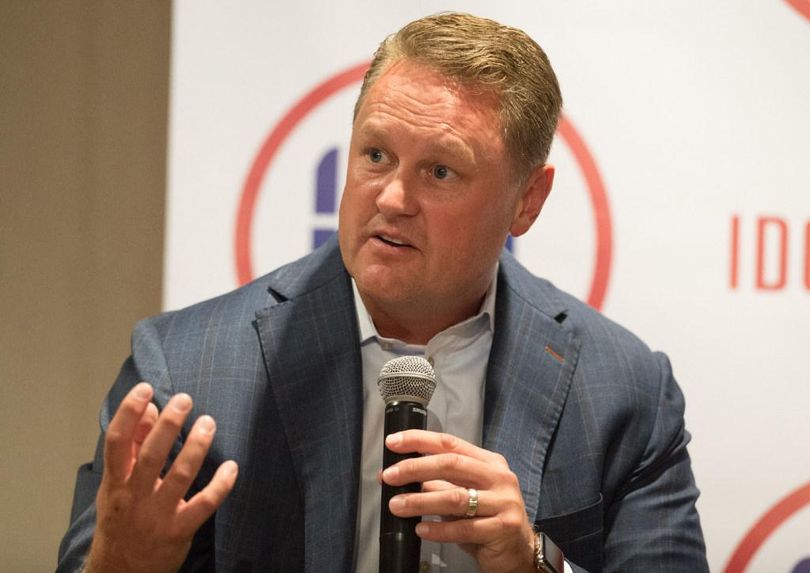Ahlquist calls for term limits, ethics reforms

Here's our full story from spokesman.com:
From staff and wire reports
BOISE - Idaho’s top politicians should face term limits and tougher disclosure laws, political newcomer and Republican gubernatorial candidate Tommy Ahlquist declared Tuesday as he unveiled a 10-point plan for ethics reforms.
The sweeping reform proposal is the latest push by Ahlquist to hone his image as a political outsider.
“The time has come for real state government reform that includes both term limits and ethics reforms,” Ahlquist said in a statement. “When professional politicians spend too much time in office, they lose touch with the realities of what Idaho families and businesses face, and as a result, put the needs of special interests ahead of the needs of taxpayers.”
Unlike his GOP opponents – U.S. Rep. Raul Labrador and Lt. Gov. Brad Little – Ahlquist has never held a political office. His ethics plan, with its emphasis on term limits, suggests he isn’t planning on staying long if elected.
Idaho is one of two states to have the Legislature repeal its term limit laws.
In 1992, Idaho voters approved a term limit law with the approval of nearly 60 percent of the electorate.
A decade later, Republican legislative leaders – convinced the public was being heavily influenced by campaigns funded with money from outside the state – passed a bill overturning the limits law. The governor vetoed that bill, but legislators, in a rare move, overrode the veto.
The issue has failed to gain traction inside the conservative Idaho Statehouse ever since, with term limit opponents arguing that such measures have faced constitutional challenges in the past and produce legislatures with inexperienced lawmakers who can be easily swayed by lobbyists.
Ahlquist’s proposal wouldn’t impose term limits on state legislators; just on statewide officials who serve four-year terms. “We have a citizen-based, part-time legislature, so we wanted the reform to focus on full-time statewide elected officials,” Ahlquist said.
Idaho Gov. Butch Otter, who is not running for re-election, is currently in the final years of his third term. Little has served as his lieutenant governor each term.
Labrador is in his fourth term as a congressman. He has previously supported legislation imposing a six-term limit for U.S. House members and a limit of two six-year terms for U.S. Senate members.
The longest serving governor in Idaho was former Democratic Gov. Cecil D. Andrus, who served four, non-consecutive terms.
Another key element in Ahlquist’s plan is requiring elected officials to disclose sources of personal income for themselves and their spouse, including investments and property assets.
Idaho currently is one of just two states with no such requirement. Ahlquist will release his own economic interests as outlined in his plan in the next few weeks.
“This is the most basic and simple of transparency measures that helps avoid conflicts of interest and impropriety among elected officials,” Ahlquist’s plan states.
Ahlquist’s plan says he would fight to eliminate a pension perk that lets longtime lawmakers “spike” their pension benefits by taking a higher-paid state appointment for 42 months at the end of their careers. Lawmakers have long debated the merits of this perk, but have not taken any major steps to repeal it.
Ahlquist also says he wants public officials banned from immediately transitioning from the public to private sector.
The practice – known as a “revolving door” – has been criticized by government watchdog groups who argue lawmakers use their positions to leverage lucrative jobs in the private world. Under Ahlquist’s ethics plan, state legislators and state executives would have to wait two years before becoming lobbyists. Idaho currently has no waiting period.
Ahlquist also called for creating a searchable database of lobbyist gifts to elected officials, as well as requiring lobbyists to report to the state if they are working on a political campaign for an elected seat. “Disclosing this relationship online is a common-sense step we can take to make sure that special interests are not unduly influencing elections and advancing their own interests,” he said.
In addition, Ahlquist wants a ban on lawmakers and executive-branch officials collecting campaign contributions during the legislative session.
Ahlquist says more than half of the statehouses across the United States have already enforced some sort of fundraising prohibition during legislative sessions and that doing so would help avoid any impropriety.
He also proposes extensive online reporting of elected officials’ out-of-state travel on state business, including costs and schedules; and eliminating the state pension of any government official convicted of a felony. “This is a simple reform: If you do not live up to the standards expected of public officials, you do not get a pension, period,” Ahlquist said.
According to the Public Employee Retirement System of Idaho, the state currently has no such restriction, though some other states do.
Finally, Ahlquist’s plan would ban the paying of family members from campaign accounts. While the practice is not illegal, it is controversial.
“Politicians in Boise should not be able to accept money from special interests and then turn around and use that money to enrich their family members,” Ahlquist declared. “This practice should be banned.”
Labrador previously defended using his congressional campaign funds to pay his wife a monthly salary to serve as his campaign’s bookkeeper, arguing that he trusts her more than anyone else. However, without an explanation, he took his wife off his campaign payroll in January.
Asked if his proposal was targeted at Labrador, Ahlquist said it “would apply to everyone.”
Staff writer Betsy Z. Russell contributed to this report.
